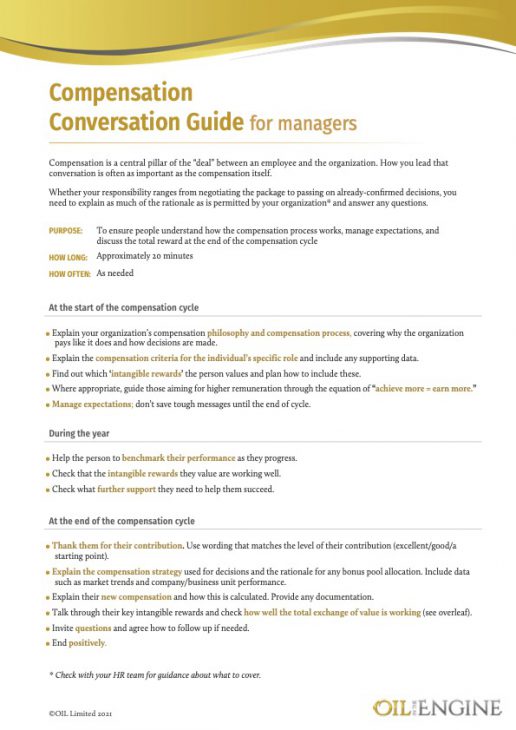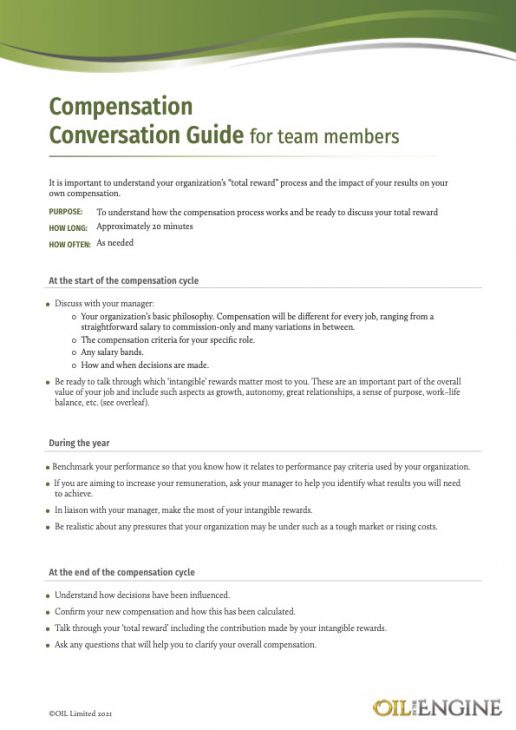Compensation is a central pillar of the “deal” between employees and the organization. It’s crucial as a manager that you’re ready to talk openly with each of your people about their results and remuneration, and that there’s no awkwardness around this — in other words, to treat compensation conversations as a natural part of your year-round discussions.
This isn’t easy, but the more you’re able to set out as much information as possible upfront, and then help each person to benchmark their performance in outline against compensation criteria as the year progresses, the more relaxed and routine that conversation will be. It also, of course, avoids any unpleasant surprises at year-end.
Here’s a few tips to help.
At the start of the compensation cycle
Sit down with your team member at the start of the cycle to cover basics about the process and how decisions are made, including:
- Your organization’s general philosophy and process. You will probably be issued with guidance about how much you can disclose. Some organizations are completely transparent about the whole process, others adopt a policy of total non-disclosure, and many fall somewhere in between. If you’re not sure, check with your HR/people team first. Keep in mind that the more people know about how the process works, the less likely they are to develop their own, possibly inaccurate, explanations for themselves. It also normalizes the conversation, avoiding unpleasant surprises when it comes to your year-end conversation. Useful aspects to cover include:
- Why the organisation pays as it does, whether lower, middle, or upper quartile
- What approach it uses, whether “total reward,” base pay, or another philosophy
- How and when compensation decisions are made, including any salary band limits, performance payments and requirements for increases to be kept within a predetermined range.
- Any pressures that the organization may be under, such as a downturn in the market
- The compensation criteria for the team member’s specific role. Again, check how much information you can provide. Unless your team member already has a broad understanding, it can be useful to cover any recent studies that have been conducted or data that has been collected to position the employee’s role correctly. It will also be important to explain to any new members of your team whether their role is subject to a salary band or range, and where they sit within that.
- What motivates that team member. The more you understand what people value most about their job, whether that’s remuneration, non-monetary benefits, or a mix of both, the more you’ll know what action to take going forward. Discuss together which two or three drivers—both tangible and intangible – are top priorities for them, and how to build in opportunities around these. (See Motivation Conversation Guide for more help). Link
Manage expectations In a tough market, managing expectations can be dispiriting, both for your team member and for you. It can help to keep in mind, however, that most of your people would probably rather receive difficult messages early on than be ambushed with bad news later. Your openness and honesty will also increase their trust in you.
During the year
The next step is to help your people to benchmark their performance as the year proceeds. Regular progress update conversations are a perfect time to do this. You won’t be able to be specific — nor should you be given the variables ahead — but do explore with each person roughly where they stand.
- Explore as clearly as possible how well they are progressing. Better still, encourage them to benchmark their performance for themselves, and how this relates to any rating or evaluation scale your organisation uses.
- Discuss where they have potential to improve their results. Every progress update should help people to strengthen their performance. This will be even more important to your team member if it’s likely to have a direct impact on their performance bonuses or promotion.
- Talk through the wider reward picture. Ask how the wider intangible benefits are working for them and how these might be strengthened.
- Check what further support they need. Find out if there are any additional actions or information that would be helpful.
At end-of-cycle
The final step is to explain the compensation decision. How you approach this will depend in part on whether your organization combines year-end performance reviews and compensation conversations or holds them at different times, but either way useful steps are to:
- Thank your team member for their contribution. Simple appreciation at the beginning of the conversation can have an extraordinary impact on people. Choose wording that accurately reflects their performance level.
- Explain influences on the compensation strategy. Following your organization’s guidelines on transparency, explain how the figures have been decided.
- Explain the employee’s new compensation. Depending on what’s usual practice for your organization, let your team member know their new total figure and/or give them the total reward statement. Where helpful, explain how this is calculated and when the change to their compensation will come into effect.
- Celebrate good performance. This isn’t just for your best people. Most will fall in the middle performance bracket, i.e., highly capable and making a valuable contribution. Applaud that!
- Talk through their key intangible rewards. Leave time to shine a light on intangible benefits and to check how well these are working for each person. They’re unlikely to be listed on the total reward statement and this makes them easy to skip, but they’re an essential part of that total.
- Fuel future performance. Add a few words about what’s ahead and their role in that.
- Plan any follow-up needed. Discuss how to follow up together if there are any issues that have cropped up. (For more on how to cover that conversation see Now You’re Talking!)
- Invite questions. Check whether there are any additional areas they would like to discuss.
- Thank them. End positively by thanking your team member in a few words once again.





